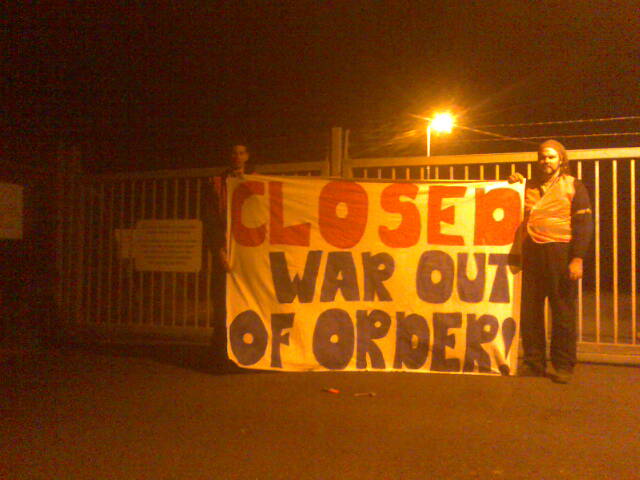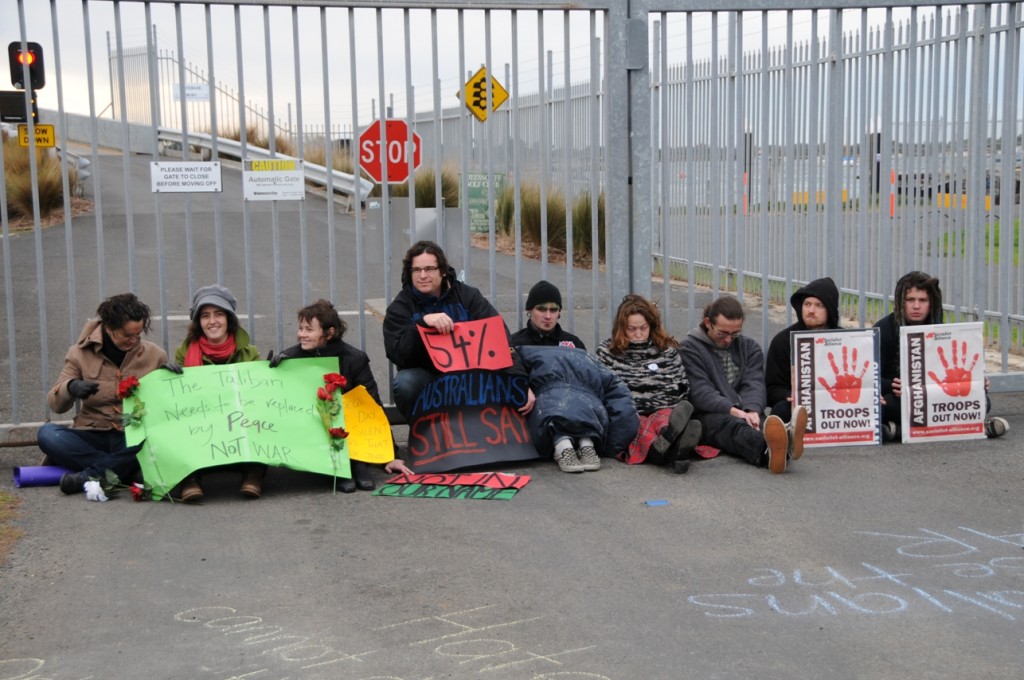
Inspired by Fr. Daniel Berrigan’s call to be prepared to bear significant costs for peacemaking, my small group of antiwar activists in Melbourne, Australia decided to “up the ante” and try some actions that might be potentially more costly than anything we had done before resisting the war in Afghanistan. This was back in October 2009.
We spent months researching Afghanistan—the geography and politics, as well as the war. We also spent some time placing these events in the context of our Christian faith, asking some hard questions about our activism: were we too focused on symbolism and not enough on effectiveness? Were we too focused on effectiveness and not enough on means?
This culminated in our action at Swan Island, a highly secretive military base in southern Victoria, Australia, near the entrance to Port Phillip Bay. The island also houses a yacht club and public golf course, all accessible via a bridge which is guarded during the day and locked at night. The base itself provides training for Australia’s elite SAS troops, who are playing most of our combat role in Afghanistan, as well as ASIS, or Australian Secret Intelligence Service (our equivalent of the CIA in the US). We figured if we could disrupt the activities of this base, we could probably disrupt some of the preparation for and implementation of the war.
So in the early hours of March 31 (the week before Easter) Jacob Bolton, Jessica Morrison, Simon Reeves and myself went to Queenscliff and swam the short distance to Swan Island.
Having worked out that most people arrive for work there around  6am (and not wanting to block the golf or yacht club traffic), we thought blocking the gate to the military base on the island was our best chance. Simon Reeves and Jacob Bolton stood in front of the gate with a banner which read, “Closed: War Out Of Order” while Jess and I made our way inside.
6am (and not wanting to block the golf or yacht club traffic), we thought blocking the gate to the military base on the island was our best chance. Simon Reeves and Jacob Bolton stood in front of the gate with a banner which read, “Closed: War Out Of Order” while Jess and I made our way inside.
Jake and Simon managed to block the gate for more than an hour while staff and police decided to arrest them; meanwhile Jess and I had waited for daylight before making our way inside the inner perimeter fence (all gates had been left open except for the one Jake and Simon were blocking).
There we found and turned off the main switchboard to one sector and then came across a seven meter satellite dish. Finding the “emergency stop” button, we pressed it and made our way to the administration center before being found by security. There we were arrested and (in a move we assume was designed to keep the story quiet) charged only with trespass.
We came to court on June 15 expecting a backlash. For me, court is always an opportunity to invite a system which serves to legitimize war and the machinery behind it to join us in withdrawing their support for war. Failing that, it’s an opportunity to invite specific people in the court (the magistrate, court clerks, those in the gallery) to act in ways which erode support for the war (eg. small sentences, words of support). Since we were pleading guilty (the necessity defence has never worked in Australia, and we didn’t have the energy to pursue it well) we imagined we’d get larger or smaller fines depending on what mood the magistrate was in.
After we explained our actions as in the context of engaged citizenship, Christian faith and humanitarian intent, and to our great surprise, the magistrate reached for a little known and very rarely used clause in the Sentencing Act which allowed him to dismiss the charges completely. This was a stunning result, and constituted clear support for our actions under the circumstances.
But there was still one step left to take: as part of continued defiance and seeking to use the court case to broaden the local war resistance movement we returned to Swan Island immediately after the case was dismissed. Here we had organized a public demonstration at the front gate, this time having liased with police (who turned out in force—almost one member for every  protester, including water police). Around 40 of the 50 people who had come to support us in court came back to Swan Island with us. After an hour of singing, chalking messages on the road and hearing from war veterans and aid workers, nine people were arrested blockading the gate. For eight of the nine it was their first arrest. A hugely successful day in terms of broadening the local movement.
protester, including water police). Around 40 of the 50 people who had come to support us in court came back to Swan Island with us. After an hour of singing, chalking messages on the road and hearing from war veterans and aid workers, nine people were arrested blockading the gate. For eight of the nine it was their first arrest. A hugely successful day in terms of broadening the local movement.
At the same time, the story was not mentioned in any major daily newspaper or outlet—neither the stunning dismissal of our charges, nor the nine arrests. This despite (or perhaps because of?) the fact that an Australian soldier had been wounded in action at almost the same time as we were in court.
This seems to add further weight to our assessment that while antiwar sentiment is high (a recent poll found that 54 percent of Australians oppose the war in Afghanistan), the opposition is largely passive, indeed inert.
While our dismissal could be seen as a clever ploy to keep the story quiet, I suspect the magistrate was genuinely moved (a small conviction and fine would have been less spectacular, and dismissal constitutes tacit support for illegal action). Still, the result is the same: no backlash.
Which means that I suspect we are back to square one: how do we use nonviolent tactics to invite the repression which garners the sympathy of the majority in order to move them to act? And how do we sustain and broaden a movement willing to suffer in such ways? Almost nine years into the war it feels like we are just beginning.

kia kaha, kia maia, kia manawanui whanau!
(stay strong, stay courageous, remain stout of heart)
Thanks Will! Big love across the ditch…
Standing by and refusing to act while harm befalls a neighbor is not a virtue; it is a vice.
“And who is my neighbour?…”
Thanks for this article Simon, a helpful review of the action at Swan Island. I think your final questions are important for the growing movement. Particularly on drawing greater backlash to engage the (currently) silent crowds. There is obviously a lot of work to do. And not just for withdrawing our troops from Afghanistan, but for planting the seed of questioning the purposes of war in the first place, and the complacency we have all participated in since this war began (and all the others).
100% agree Chris, thanks. As I see it, our job is not over once the war is over…we’re just in a much more primitive position right now – I keep coming back to Dan Berrigan’s statement after the first Ploughshare action, “Ours is a kind of primitive situation, even though we would call ourselves sophisticated. Our plight is very primitive from a Christian point of view. We are back where we started. Thou shalt not kill; we are not allowed to kill.” There are so many other more intelligent, nuanced things I’d like to be able to say, but here we are, having to make the first step of simply stopping killing. Again.
“We sleep soundly in our beds because rough men stand ready in the night to visit violence on those who would do us harm.”
“Those who ‘abjure’ violence can only do so because others are committing violence on their behalf”
This might be where we differ.
In fact, it goes against the evidence. Our invasion of Iraq, Afghanistan, Iraq again and unquestioning backing of Israel at the expense of Palestinians is one of the many factors fuelling terrorism, resentment and hatred across the Middle East, Northern Africa and Asia (not to mention constituting terrorism itself, despite its State backing).
Let’s get beyond the reflexive skin-deep rhetoric of “making the world safe for democracy” and “fighting for our freedom”, all of which doesn’t stack up to the slightest scrutiny and runs against all the available evidence, despite its being repeated like some sort of religious mantra (with the accompanying blind faith of brainwashed cult members).
I don’t on any level agree that having people ready to do violence on my behalf makes me safer. On the contrary, it makes us less safe. And even if it didn’t, it wouldn’t be worth it.
We probably differ on a whole lot more, but no worries.
Honestly, I would retract the talk about reflexive skin-deep rhetoric, because that’s largely the substance of the left’s opposition to the use of military power. I’ve witnessed huge anti war protests in NYC and there was a prodigious amount of kool-aid consumed and hardly any rational thought….similar to sneaking on a military installation and taking pictures with vapid slogans.
Not on any level? Respectfully, that is a very naive opinion bordering on fantasy.
I believe violence on anyones’ part makes the world a less safe place. At the moment it is the US lead western forces who are making the world less safe. Not only for the Afganis but when retaliation inevitably comes it will be metted out to us who have perpetrated violence in the name of so-called safety. God sees to it that all justice eventually is repayed.
I can end the war.. Just hear me out 856-534-2963 I have proof!!